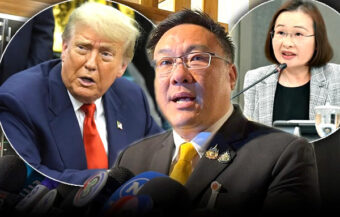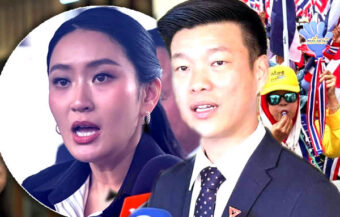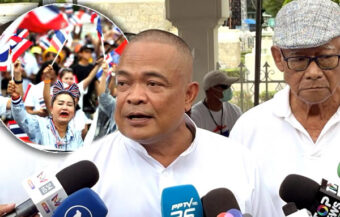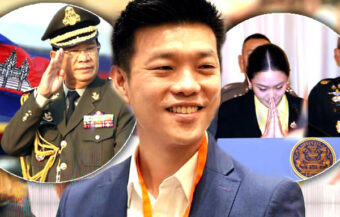Political naiveté on the part of the leading Pheu Thai Party in believing that the coalition government, through the electoral reform process, was going to gift it the means to achieve an outright majority. This has been evident since April this year and yet the party continued with the charade. Now with an impressive victory in the censure debate in July and changes underway to see a return to the one ballot voting process, not only is the government looking like it will survive until a snap election is called but there is now an increased likelihood of a return of a coalition government if not led by General Prayut Chan ocha then by his ‘brother in arms’ General Prawit Wongsuwan.
July was a significant month in Thai politics. First of all, it saw the government survive what looked like the most dangerous censure motion since 2019 despite potentially damaging revelations about monthly payments to smaller parties revealed by Setthakij Thai Party (Thai Economic Party) leader Thamanat Prompow. This weekend saw political scientists accept that Prime Minister Prayut Chan ocha and his unwieldy coalition government appear on course to finish their term although a snap election is predicted to be called at the end of the year. However, perhaps the greatest shift that was seen in July was the effective reversal of the electoral reform process that was passed last year by parliament which could see the 2023 General Election being carried out, once again, using a one ballot process and calculation formula which is bound to limit the opposition and in particular Thailand’s largest party, Pheu Thai. This shift in the voting process and the failure of the opposition to collapse the coalition government in the recent censure debate shows that General Prayut retains all the cards.
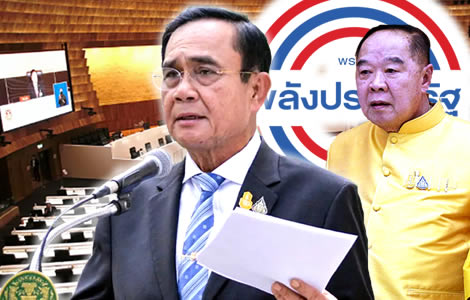
The surreal nature of Thailand’s politics can be seen from the confidence shown after the recent censure debate by the coalition government parties who barely account for 20% of the electorate in opinion polls since the start of the year while the opposition has significantly more than majority public support.
Prime Minister Prayut Chan ocha came in third place as the popular choice for PM in the last poll by the National Institute of Development Administration (NIDA) at the end of June, on June 26th to be precise, with 11.68%.
Sudden move with July 6th vote, in parliament, to change the party list calculation formula has set the dominoes in motion back to a one ballot system
That poll was led by the Pheu Thai Party’s Paetongtarn Shinawatra (25.28%) and the Move Forward Party’s Pita Limjaroenrat (13.24%) with the Pheu Thai Party and Move Forward Party between them garnering 54.24% of the prospective electorate with the Pheu Thai Party on 36.28%.
You would have thought there was no ground whatsoever for optimism for a return of a deeply unpopular coalition government.
That was, of course, before the reverse course on July 6th where legislation going through its third reading in parliament, having been approved by a standing committee, was reversed so that the formula used for calculating party lists seats was fundamentally altered from an agreed formula of 100 to match 100 seats under a dual ballot system.
It was changed back to the older formula of 500 used in the last election when a single ballot election system was used.
Possible crisis brewing over electoral reform bills as Minister says July 6th change cannot work in practice
This was followed by a revelation from the experienced Minister of Justice, Somsak Thepsutin, who has served before in government under exiled Prime Minister Thaksin Shinawatra, that such a change may not be practically workable given the that it was already agreed to move to a two-ballot system.
Change in voting system for the next election should be the dominating news story but in Thailand, it goes under the radar except for political scientists
In any other democracy, such revelation would be the dominating news story.
The basis for holding a General Election which is to be held in the next six months or so is not clear and the changes being discussed may mean that one party, the country’s largest, could be severely disadvantaged.
Surachai Sirikrai is a lecturer at the Faculty of Political Science at Thailand’s prestigious Thammasat University.
Speaking to the Bangkok Post this Sunday he said that he now believes it likely that General Prayut will complete his four-year term in office as an elected prime minister and even if an expected Constitutional Court review of his term under the 2017 Constitution’s eight-year rule, which is expected from September, after one interpretation suggesting that the prime minister’s term is limited from August 2022, goes against him, the Palang Pracharat Party leader and one of the ‘brother in arms’ behind the 2014 coup, Deputy Prime Minister Prawit Wongsuwan, is well positioned to take over.
General Prawit along with the Ministry of the Interior, General Anupong Paochinda and General Prayut are three former army commanders who are believed to be the power behind this government as they were behind the junta regime from 2014 to 2019.
‘Not as democracy should be’ says Thammasat expert identifying the absence of a ‘democratic conscience’
Mr Surachai was depressingly frank in his assessment of Thailand’s politics at this time.
He said that he was confident before the censure debate that the government was in danger of falling but in the end, he was left somewhat dismayed.
‘It’s not how democracy should be. It turns out several parties which ought to be dependable jumped on the dictators’ bandwagon,’ the political expert said, explaining that in the face of the opposition’s onslaught, coalition partners with a ‘democratic conscience’ should have pulled out of the government.
Mr Surachai feels that what we saw during the recent censure debate and the political developments around it, means that General Prayut and his key associates have full control over the political field.
‘As long as one has the means and might at their disposal and a potential successor on standby and no election can unseat him, no task is impossible to accomplish,’ he disclosed. ‘It is also why Thailand will never be a democratic country.’
Disconnect between politics and democracy in Thailand and the day-to-day lives of ordinary Thais
These sentiments were echoed by Chaiyan Rajchagool of the School of Political and Social Science at the University of Phayao who sees a disconnect between the hurly-burly in parliament and politics on the streets in Thailand.
At the same time, Mr Chiaya was clear that street protest activity does not unseat a government in Thailand and noted that such activity, in the past few years, even with the opposition parties in parliament supporting the need for political change, has not altered the government’s course.
‘Nothing came of it,’ Mr Chaiyan explained last weekend. ‘Street protests never succeeded in ousting a government.’ He said that the government in Thailand is effectively underpinned by the police and the country’s armed forces.
It is difficult for foreign observers and even analysts to fully understand the dynamics of Thailand’s new form of politics since the introduction of the 2017 constitution in a country where most of the population is more interested in making daily ends meet than giving too much time to thinking about who occupies the highest offices in the land.
Coup in 2014 was welcomed by the Thai public and General Prayut retains popular support because of it
The one thing the public in Thailand will not tolerate, however, is political unrest and upheaval in those daily lives which explains why the current Prime Minister, General Prayut Chan ocha, remains a relatively popular figure in spite of his government and the third popular choice for the role of PM in the authoritative June 2022 opinion poll despite leading the 2014 coup.
While his election as Prime Minister in 2019 was aided by a constitution that stacked the decks in his favour and limited the country’s most popular political party, there was some support for the former army commander whose coup in May 2014 restored normality to a country riven by dangerous political street protests which, at the time, brought the capital Bangkok to a near standstill.
Censure debate win in July paves the way for the government to get to an end-of-year snap election
On Saturday 23rd July, the Thai government led by the Prime Minister and 11 of his ministers won a significant vote in the House of Representatives following a censure debate brought forward by the opposition, the last one of this parliament.
It is a result which appears to open up the possibility that the government will complete its term or just about since there is speculation that the House of Representatives will be dissolved after the Asia-Pacific Economic Cooperation (APEC) summit due to be held in November this year.
This would lead to a snap General Election which may provide Prime Minister Prayut Chan ocha and his ministers favourable optics as leaders on the international stage while it coinciding with what may be a high point for the economy as it continues to recover this year driven by foreign tourism since the kingdom fully reopened on July 1st.
General Prayut will be able to highlight the success of his ministry in surviving nearly four years of crises against a backdrop of a sluggish but improving economy since the foreign tourism market was opened up and consistent economic data showing the resilience of Thailand’s workers.
Only 2.74% of Thai people watched the fully televised censure debate with 69.28% not hearing anything
A poll on Sunday showed that only 2.74% of the Thai public watched the fully televised censure debate with a further 9% watching the debate periodically while nearly 70% or 69.28%, to be exact, failed to hear a word of the four-day parliamentary exchanges where serious allegations of corruption were revealed.
These included an allegation of monthly payments to some MPs in small parties who support the government and which were reportedly revealed in screenshots by former minister and Secretary-general of the ruling Palang Pracharat Party, Captain Thamanat Prompow.
However, Captain Thamanat is seen as not acting with clean hands in the matter.
The former minister and Setthakij Thai Party (Thai Economic Party) leader is already a colourful and controversial figure as sources within the small parties quickly dismissed the claims as sour grapes as the government survived the critical vote.
Explosive charges of payments to smaller parties made by former minister and Palang Pracharat Party Secretary-general Thamanat Prompow dismissed
The Setthakij Thai Party (Thai Economic Party) switched sides just before the debate to vote against the coalition government.
The ex-minister, also a former member of the opposition Pheu Thai Party and the man reportedly responsible for orchestrating a parliamentary coup against the Prime Minister last September, led his Setthakij Thai Party (Thai Economic Party) out of the coalition just before the vote and appeared determined to bring the government down.
He has since been encouraged by other MPs in the house and activists to approach the country’s powerful Election Commission and the National Anti-Corruption Commission about what he knows and his role in it.
Smaller parties threaten to sue while others say the payments were travelling expenses paid to the MPs
However, news coverage on what would be a front-page scandal in western democracies was diminished with talk of leading members of the small micro parties threatening to sue anyone who accused them of wrongdoing while one source, close to the parties, even suggested that Captain Thamanat himself knew the monthly payments were simply travelling expenses for the members agreed with government figures and was using the arrangement as a pretext to undermine the ministry.
On Sunday, political scientists in Thailand were more interested in looking at the months ahead with the likely survival of the government of Prime Minister Prayut Chan ocha, no mean feat in Thailand and even speculating on the chances of his government returning to power after an election which will be held by March next year.
Talk circulating last week of a return to the one ballot voting system for the next General Election
The censure debate fireworks were followed by a development, on Thursday, July 25th, when reports began circulating in parliament that a change to the electoral laws was now being pushed from unknown quarters to revert to a one-party ballot system.
This would be in direct conflict with the process and the electoral reform bills first passed in September last year.
These rumours have begun the same way as rumours began of changing the election calculation formula from 100 to 500, just weeks before, for party list seats in the next General Election and which culminated in a sudden vote through a joint legislative sitting which saw 354 MPs vote for the 500 formula while only 160 voted to divide the national votes by 100, on July 6th.
Those who supported the old system were from among the coalition government parties and smaller parties who will benefit from a return of the 2019 election system which looks like the direction things are heading towards.
Polls consistently show public support for smaller parties even as the majority support the opposition
Interestingly, opinion polls in Thailand have shown consistent public support for maintaining smaller parties in parliament although under the 2019 General Election, this effectively saw Pheu Thai Party support distributed to them as the country’s leading party failed to garner even one party list vote because of the one ballot system even though it polled the highest number of votes nationally.
In essence, its success at a constituency and local level was used against it because of the party list system which strongly favoured small parties over the bigger ones when used with a calculation of 500 and a one ballot system.
Poll supports retention of the one ballot election process which would torpedo Pheu Thai landslide hopes
The situation is so complicated that most Thai media outlets do not fully explain it for fear of boring audiences. The issue is not receiving in-depth coverage because of its technical nature.
Yet it may well be the decisive factor that alters the course of the country’s next General Election and the formation of the next government as it did in 2019 after all the election canvassing, opinion polls and news coverage was spent.
Complicated story which keeps shifting as the parliamentary system moves forward shrouding the change
Last Thursday’s rumour is likely the precursor to a move back to the 2019 voting system and it should come as no surprise to the opposition who were warned as far back as April that something was afoot when an opinion poll showing support for smaller parties appeared in the same week as the steering committee in parliament voted down a synchronised numbering system for the two ballot process which would have benefited Pheu Thai.
Key committee vote in parliament on March 30th ruled out linking party numbers with candidates, something that would also have benefited Pheu Thai
The complicated nature of the voting process and the similar nature of parliamentary procedures have served to shroud this process.
However, the country’s leading party followed the charade in the hope that the government parties were somehow going to gift it the means to win an outright victory in the next General Election, something that was always highly unlikely.
While demonstrating parliamentary trust and sincerity, Pheu Thai, has also, in equal measure, been politically naive.
Difference between a Pheu Thai Party-led majority government in power or a return of some form of coalition government, yet it is not prime-time news
Pheu Thai MP for Ubon Ratchathani Somkid Chueaknong, this week, described the proposed move as an attempt by the government to improve its odds in the forthcoming election thereby thwarting a Pheu Thai landslide which even Deputy Prime Minister Wissanu Krea-ngam accepted was likely under the reformed voting system proposed up to the July 6th parliamentary vote with a two ballot voting process for the General Election.
‘Pheu Thai doesn’t care how many ballots will be used, but we care about what is right and what the majority says,’ Mr Somkid explained but challenged the coalition parties and those suddenly now advocating the single ballot process to explain how it does the country any good.
2017 Constitution has shown itself to be resilient and changed the whole nature of politics in Thailand
The answer to that question would be to define the whole thrust of the 2017 Constitution and the democratic environment it has ushered in with fragmented parties in parliament including the smaller parties meaning power is more evenly distributed even though it leads to the sort of indecisive government the country has seen since 2019.
Indeed, this was the tenor of the reforms ushered in by the junta government from 2014 to 2019 to root out corruption, prevent too much power from being placed in the hands of one party, and bring strict controls over political parties to ensure that they are not controlled by any one individual or faction while also ensuring that government policy is less radical and calibrated in line with long term planning.
On Thursday last, Move Forward Party MP Thirajchai Phanthumat was having none of this as he insisted that the last-minute changes to revert to a one ballot voting system would fail to ensure a fair election in the months ahead.
Join the Thai News forum, follow Thai Examiner on Facebook here
Receive all our stories as they come out on Telegram here
Follow Thai Examiner here
Further reading:
Senator warns that Paetongtarn Shinawatra or Ung Ing, Thaksin’s daughter, is wrong for the job
Legal pot does not appear to be working for Anutin’s Bhumjaithai Party in latest opinion poll
New Shinawatra may lead the next quest for power as Pheu Thai Party aims for 14 million members
Bad news for PM and Palang Pracharat in Bangkok on Sunday as resurgent Pheu Thai Party wins big
By-election polls amid a weak economy and rising food prices may mean a 2023 General Election
Wife of deposed Bangkok MP Sira campaigns for his job based on his 3 years of service to people
Move against Pheu Thai, the kingdom’s biggest political party, over it’s alleged links to Thaksin




